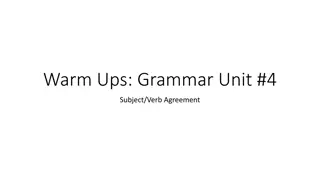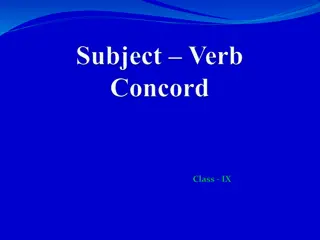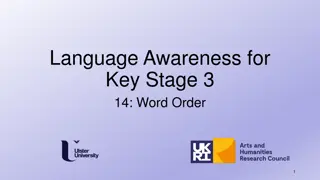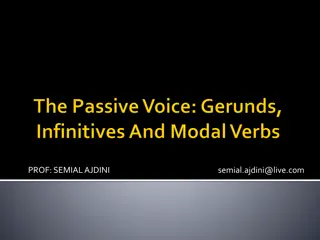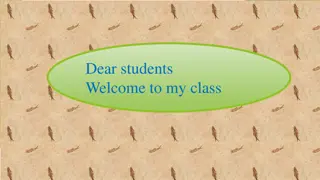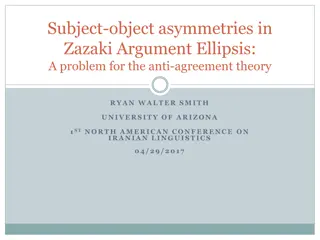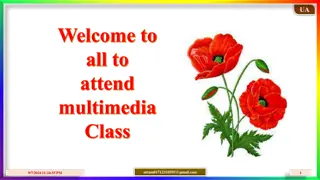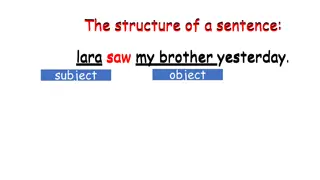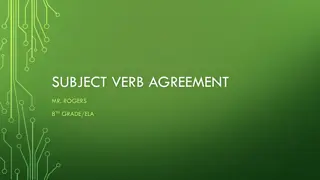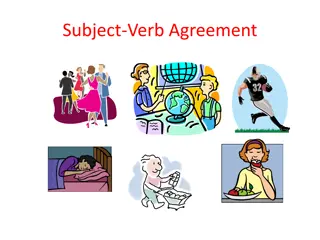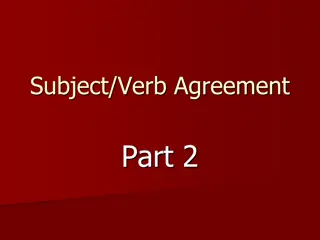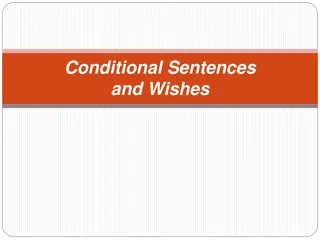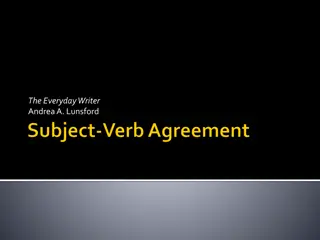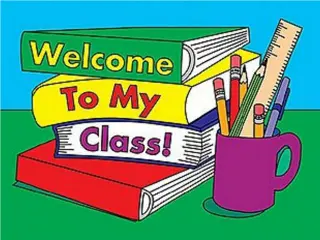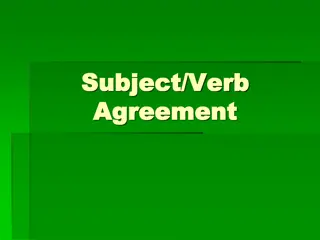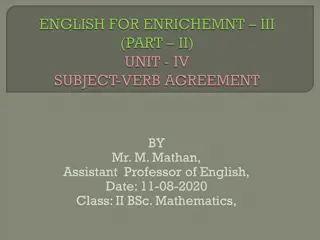Understanding Subject-Verb Agreement in English Sentences
Subject-verb agreement is crucial in English grammar to ensure sentences are grammatically correct. The subject of a sentence must agree with the verb in terms of gender, number, person, and case. Incorrect use of verb can lead to ungrammatical sentences. Learn how the subject and verb should match to form clear and accurate sentences.
Download Presentation

Please find below an Image/Link to download the presentation.
The content on the website is provided AS IS for your information and personal use only. It may not be sold, licensed, or shared on other websites without obtaining consent from the author. Download presentation by click this link. If you encounter any issues during the download, it is possible that the publisher has removed the file from their server.
E N D
Presentation Transcript
FYBSc English (US01AENG21) TOPIC 3 Concord Subject- Verb Agreement
Concord Subject Verb Agreement Agreement of words with one another, in gender, number, person, or case. In any sentence, the subject has to agree with the verb. That is to say that the verb must be according to the subject of the sentence. For example, He (singular subject) is(singular verb) a student. They(Plural) are (Plural verb) students.
Why should we worry about subject verb agreement? The wrong use of verb makes the sentence ungrammatical. Eg: Acontainer of nuts and bolts were found in the cellar. Arange of factors have been considered.
The subject of a sentence is one of the basic parts of a sentence. The other basic part is the predicate. The predicate tells us something about the subject (i.e., it tells us what action the subject is performing, or it describes the subject)
What is a subject in a sentence? The person or thing that is being discussed or described. A subject is a part of a sentence that contains the person or thing performing the action (or verb) in a sentence. (See What is a verb?) Verbs are the action words in a sentence that describe what the subject is doing. A verb is a word or a combination of words that indicates a state of being or condition.
Examples of Predicates In each example below, the predicate is shaded. (The subjects of the sentences aren t.) John lives. John lives in Mumbai The messge contained exciting news. The girls in our office are experienced instructors.
Subject of a Sentence 1) The subject of a sentence is the person or thing doing the action or being described. Ram ate the cake. 2) (2) My friend is tall .(My Friend is the subject of the sentence. My friend is being described.)
Here are the main ways that a subject appears in a sentence 1) The subject performs an action: My dog bit the postman. 2) The subject is described: My dog is very energetic. (When the subject is being described, the verb will be a linking verb.) 3) The subject is identified: My dog is the one in the middle. (When the subject is being identified (which is just another way of being described), the verb will be a linking verb.) 4) The subject has an action done to it: My dog was taken to the vet. (When the subject has an action done to it, the sentence is called a passive sentence.)
PLURAL NOUNS ,but singular IN MEANING The NEWS is / was Politics subject. Statistics / Physics / Mathematics is /was compulsory. The UNITED NATIONS (UN) is a world body The United States is a super power. not good. is a very interesting
Uncountable Nouns take singular verb money Food Time Informati on energy needed Wasted spent used Is 1) Some Was 2) Much of the Will be 3) A little saved
Countable nouns take plural verbs Some boys/ girls (number/countable) are absent. Most of the books are costly. None of the studentswere present. Many of the students were absent. A few students were late.
COLLECTIVE NOUNS take SINGULAR VERBS The family The Australian team of the 90s A pride of lions A group of students is/was rich was the greatest team ever. is near a pond in the jungle has on gone on an educational tour.
SUBJECTS joined by and take plural verb Tobacco and alcohol Oil and water are bad for health. do not have a class each. / are mix. He and I both friends
SINGULAR NOUNS connected by ANDBUT EXPRESS ONE IDEA TAKE SINGULAR VERB Slow and steady Bread and butter My friend and colleague Idli and sambhar wins the race is a common breakfast. waiting for me. is was given as breakfast.
If two singular subjects are different persons .. My Uncle and my friend My room partner and my friend My friend and my colleague are coming to meet me. have brought tickets for a film. are getting married.
Each and every + noun take a singular verb Each man and each woman The plane crashed and every man., woman and child Every student and every teacher has to carry his/her ID proof. killed. was has been is present in the function.
Word forms of some, any, every,no take singular verbs Everybody /everyone Everything No one / nobody Somebody/ someone Everybody was is likes has does not absent yesterday. under control here to eat in this hotel. come in this room. drink tea.
Noun phrases with neither/ either Neither of us / them Is/was Interested in this film Neither Ram nor Shyam Is/was present today. Either Ram or Shyam has to play for the team. Neither the teachers nor the Principal was willing to give permission Either Ram or his friends are throwing a party today.
Singular subjects joined by certain connectors take singular verb.( As well as, along with, together with, in addition to, accompanied by) Ram as well as his brothers is going on a tour. Ram as well as his brothers likes eating Chinese food The boysas well astheir teacher are standing on the ground Mohan s parents, rather than Mohan himself have come to meet me The housewithall its furniture and fittings is for sale.
Practice 1. He _____(Be) in the class now. 2. They _______ (be) in the class now. 3. He _________(be + write) a letter now. 4. My car _______ ( to need) repairing. 5. Many people _______( to like) crossword puzzles. 6. Hobbies ________ (to give) us something to do. 7. Work _________ (to keep) people busy. 8. Nobody _______ (to have) enough money. 9. Our class _____ (to want) to learn Spoken English. 10. This group always _______ (to come) first.
11)Neither of us _________ (to understand) his jokes. 12)The audience always ___________ (to clap) when he sings. 13)Honesty and courage _________ (to win) everyone s heart. 14)You and I always ___________ (to cooperate). 15) Most people _________ (to watch) cricket in India. 16)Both John and Mary ________ (want) to study Hindi. 17)Some of the information _______ (is/are)
20) My friend and colleague _______(is / are) getting married. 21) My friend and my colleague _______(is/ are) getting married. 22) Either the teacher or the boys______(is/are) wrong. 23) Either the boys or the teacher________(is/are) wrong. 24) Either you or I_______(am/are) wrong. 25) Neither the driver nor the children_______ (was/were) injured in the accident. .
26) Mr.Patels secretary and his partner_________ (is /are) going to the party. 27) Mr.Desai ,( accompanied by his two friends,) _____ (is /are) going abroad. 28) The boys, accompanied by their teacher,_______ (is /are) going for a picnic. 29) Bats, like other birds,______ (have / has) wings. 30 A bat, unlike other birds, _______ (have/ has) teeth. .
36 None of the books from the library ____ (is/are) missing. 37 A number of questions______ (was /were) asked by the VISA Officer. 38 His secretary and his typist_____(is/are) on leave today. 39 Sachin s innings at Sharjah_______ (was/were) the best of his career.
31) Mr. Patel has two sons. Each _____ (have / has) a bike. 32) A large sum of money_______ (was/were) deposited in the bank. 33) Most of the milk________ (has / have) been drunk by the cat. 34) Most of the biscuits________ (have/has) been eaten by the dog. 35) Idli and Sambhar______ (is/ are) a usual breakfast for South Indians


